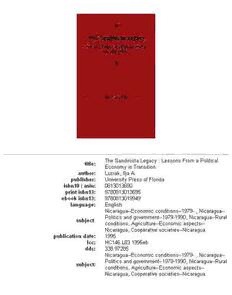
The Sandinista legacy: lessons from a political economy in transition PDF
01995·0.468 MB·English
Most books are stored in the elastic cloud where traffic is expensive. For this reason, we have a limit on daily download.
Preview The Sandinista legacy: lessons from a political economy in transition
Description:
"An original and carefully crafted piece of work. . . . Scholars and analysts working on Nicaragua will want this book."--Rose J. Spalding, DePaul University "Important contributions not only to the comparative literature of regime transitions (particularly 'post-socialist' transitions), but also to the study of Nicaragua and Central America. . . . Presents a nicely balanced picture of the Sandinista record of accomplishments and failures, including a well-reasoned analysis of who or what was to blame for the failures."--Richard Tardanico, Florida International University When the Sandinistas came to power in Nicaragua, they promised to establish social and economic democracy. As Ilja Luciak tells us in this study of regime transitions, their legacy is mixed, though they deserve credit for institutionalizing electoral democracy. While they improved the life of the peasantry and achieved an impressive record in the areas of education and health, by 1990 their progress had been halted and in many instances reversed. Luciak maintains that the Sandinistas' loss at the polls in 1990 was a blessing in disguise: after eleven years in power, the revolutionary movement needed time to rejuvenate itself and return to its popular roots. He examines the evolution of Sandinista democracy and analyzes Sandinista policies toward two rural grassroots movements, the Association of Rural Workers and the National Union of Farmers and Ranchers, showing the inevitable tension that results when a vanguard party attempts to strengthen participatory democracy. He also examines the development of the tiendas campesinas
See more
The list of books you might like
Most books are stored in the elastic cloud where traffic is expensive. For this reason, we have a limit on daily download.
